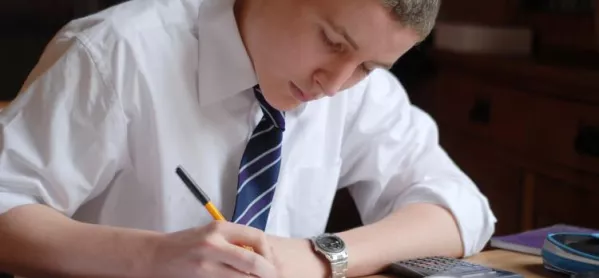- Home
- Exclusive: Academy chain moots ignoring DfE target by dropping EBacc entry to 15%
Exclusive: Academy chain moots ignoring DfE target by dropping EBacc entry to 15%

One of the biggest academy chains in the country has discussed entering as few as 15 per cent of pupils for the EBacc as part of plans to provide a more “appropriate” curriculum, Tes can reveal.
The idea, floated in a board meeting of Greenwood Academies Trust, contrasts with a government target under which 75 per cent of pupils should be studying for GCSEs in five EBacc subjects - English, mathematics, history or geography, the sciences and a language - by 2022.
The target would originally have seen 90 per cent of pupils taking the EBacc by 2020, but the Conservative manifesto extended the deadline to 2025, and the target was changed again last July.
The weakening of the target has followed warnings by headteachers and campaigners that it could lead to the Arts and technical subjects being sidelined and will be hampered by a shortage of modern foreign language teachers.
Now a Freedom of Information request reveals that board members at Greenwood Academies Trust, which runs 32 academies in the East Midlands, East of England and South East, have discussed putting forward only 15 per cent of pupils for the EBacc.
The trust’s director of secondary improvement Tom Campbell told trustees there was a “need to reduce the percentage of students that do EBacc”, and that “the proportion of pupils who do EBacc is not right,” according to minutes for a meeting last October.
The minutes add: “TC [Tom Campbell] stated that principals need to be reassured that it is not the target to have 80/90 per cent of students entered for EBacc. If the board are comfortable it could be 15/20 per cent.”
This year, the trust entered more than 40 per cent of pupils for the EBacc - although one academy was putting 76 per cent of pupils forward for it, according to the minutes. This, Mr Campbell is quoted as saying, was “too many”.
He told the board: “The curriculum there is too crowded. They [pupils] might perform better on different pathways.”
Mr Campbell also “described his frustration that secondary principals are not pushing against barriers and challenging the curriculum - things as a former head he would have done,” the minutes states.
Greenwood’s chief executive officer Wayne Norrie and director of education Dean Pomoroy had met with Ofsted officials, and discussed “GAT’s intention to rebalance the EBacc entry”, the minutes continue.
The pair were told that “EBacc is not something that is going to go away.”
Under a heading of “Updated priorities and milestones”, the minutes list an action point for the trust: “Review appropriateness of the curriculum for KS4: Reduce EBacc entry where appropriate.”
Greenwood refused to confirm or deny that the board had decided to pursue a target of 15-20 per cent, when asked by Tes.
A spokesperson said: “It is crucial that all students take the qualifications that are right for them, and are in their best interests.
“In some cases, that will mean the EBacc...This year we expect over 40 per cent of our students to enter the EBacc - well above the national average.”
“But in all instances, students must be on appropriate curriculum pathways which will enable them to succeed in the next stage of education and employment.
“As a trust we believe it is important to balance the importance of GCSEs with other qualifications in drama, music, arts and PE. We are committed to focusing on the strengths of each student, providing them with a well-rounded education including resilience and creativity, and preparing them for success after school.”
Geoff Barton, general secretary of the Association of School and College Leaders, said Greenwood’s discussions reflected the sense of unease among many headteachers about the EBacc target.
He said: “It’s part of an increasing sense that the range of subjects that lots of us think are important are being marginalised.”
The board minutes show that “we’re starting to move away from thinking we have to jump through accountability hoops”, said Mr Barton. He added: “There’s an increasing need to recognise that we don’t want to be the generation of leaders who reduced the curriculum to something so mechanistic.”
The union leader also questioned how the Department for Education would enforce the target, and said the delayed deadline showed a “pragmatism in government that they don’t think it’s going to be hit any time soon.”
The DfE did not respond to Tes’ question about how it planned to enforce the target.
A spokesperson said: “The EBacc is a key part of our drive to extend opportunity for all and is already helping children, particularly those from disadvantaged backgrounds, to benefit from a rigorous education.
“We are clear that we expect all schools to offer options in addition to the EBacc, so that pupils have the opportunity to study subjects that reflect their own individual interests and strengths. It is encouraging to see that under this government the proportion of pupils taking core academic subjects has risen from 22 per cent to 38 per cent.”
Keep reading for just £1 per month
You've reached your limit of free articles this month. Subscribe for £1 per month for three months and get:
- Unlimited access to all Tes magazine content
- Exclusive subscriber-only stories
- Award-winning email newsletters



